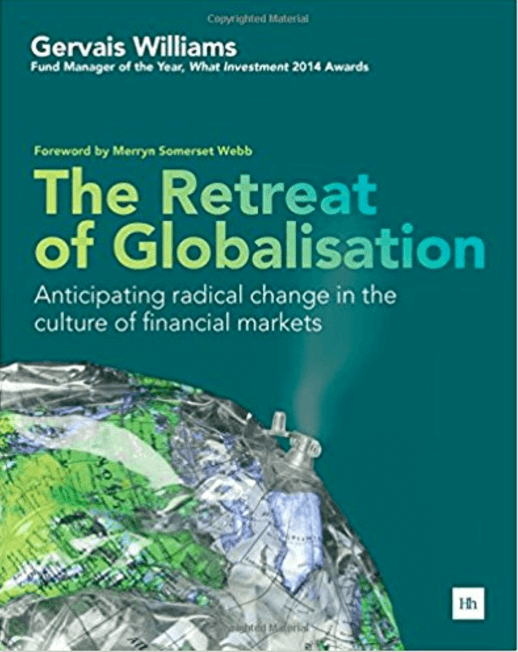Gervais discusses 2 stocks he's excited about plus the impact of receding Globalisation
Companies: A&J Mucklow Group, Esken Limited
This week, I met up with Gervais Williams, who runs Miton Group’s U.K. Smaller Companies Fund, has been a city stalwart and key voice in small and mid-caps for over 30 years.
Gervais recently published a new book titled The Retreat of Globalisation which is a fascinating read and well worth the investment.

Below is a transcript of our Q&A session which you can listen to here.
Gervais, you’ve been investing since 1985, what are the two or three key things you’ve learned so far in your career?
Well, as I've been investing since 1985, I’ve got a little bit of scar tissue from the past. What it really boils down to is: Yes, it’s lovely to make good investments, yes it’s great to make good money for our clients in the long term, but the scar tissue is mainly related to when things go wrong.
My advice would be to keep focusing on the balance sheet, most particularly the debt. If you get things wrong share prices go down, if you get things wrong and there's a lot of debt on the balance sheet and the company is struggling to finance its business, then you tend to get these emergency dilutionary rights issues which are hugely negative.
It means you have to write a check to put more money into a failed investment. It means that many times the share price never fully recovers because it's a very low level, and most particularly it means that you can’t put it into other things which you might find have more attractive risk/reward ratios.
Keep a close eye on the downside risk to the balance sheet debt. In my view, it's not been a big problem for the last six or seven years since the financial crisis. On a long term basis, although we had 2008, we had 1998, we had 2000, we have had some setbacks - most of those have not really lasted, and interest rates have been cut and things have recovered faster. We've not really had a proper downturn, a downturn when clients risk losing permanent capital, probably for 30 years. That's my biggest attentive issue at the moment, not just making money for clients but trying to do the best I can to steer around that risk should we get a setback in the next few years.
You’ve just published a book on globalisation and the receding nature of globalisation, in which you lay out that there are potentially some troubled times ahead of us. I wondered how that has influenced your portfolios and your investment decisions over recent times?
The main thing that I talk about in the book is that the pattern of the markets might change as we get political change coming through, with economic decisions being different to what they were previously. As that comes through, we get that pattern change in the market, which is an opportunity as well as a risk. The opportunity is that certain stocks which haven't necessarily been that strong in terms of long-term returns over the last 10 or 20 years might do rather better. Companies which have perhaps had a great run up to now might tend to run out of steam.
One of the big advantages of last 30 years has been that the price of debt has come down further and further, partly because of low-cost imports, and on top of that, globalisation of trade has made it easy to access growth. Going forwards, we would argue that one of the main drivers of return is that it is going to be much harder to find economies which are growing well, and most particularly that many companies will struggle to grow.
That gives us the advantage of being able to get into not just small companies and big companies, but companies which still continue to grow irrespective of a flat world environment and, most particularly, companies which are able to invest for productivity improvement, drive cash flow, and hopefully see good and growing dividends, even at a time when dividend growth across the market is more constrained.
It seems that recently value investing as a theme has been underperforming whereas growth has been going gangbusters. Would you would you say that there might be a situation where that reverses going forwards?
Undoubtedly it will. As with all these things, it's a bit yin and yang. Sometimes it's growth, sometimes it's value. What we do think, though, is that bond yields don't come much lower. We are probably at the end of a 25 or 30-year trend of falling bond yields and that has definitely enhanced the value of assets, and particularly of growth stocks. As growth slowed in the last five years, the focus of investors has been on companies which are still recording, not just good growth, but very good growth. This has become very intense, especially in the AIM market where we've seen valuations of some of the best performing growth stocks up and above 50 times earnings.
These are very demanding ratings. Some of these companies are very good, but if they miss or disappoint in any way at all, you can see the share prices beginning to come off. We would suggest you move towards companies which are less well-known, which are still growing but perhaps a little less fast, hopefully with a good and growing prospect of earnings growth and ultimately dividend growth over the next three to five years.
If you can find some of those which are "four-wheel drive", that are robust companies that will not be put off course by an unexpected setback in Europe or the Far East for instance, then those are going to be not just good companies but valuable companies because they can continue to generate a return, even if markets themselves don't help as much.
We would suggest you move towards companies which are less well-known, which are still growing but perhaps a little less fast, hopefully with good and growing prospect of earnings growth and ultimately dividend growth over the next three to five years.
There are a lot of conversations on our side, and elsewhere, around growth companies and p/e ratios and how it's very difficult if you're fundamentally driven to invest in some of these stocks when they're trading on, as you said, 50x plus. You can end up missing out on some of the Fevertrees of this world. Is that something that you prefer to stay clear of, so you don't get burned by the ones that don't quite work out?
Well, we’re there to make money for our clients, so it would be churlish to turn up to our clients and say: “You’ll be thrilled that we haven't held any companies which have gone up because we're so cautious.” That's certainly not going to work. But what it does mean is that the investor interest in some of the recovery stocks, which are more value in their nature, has been unusually low in recent years, because people have not been trying to work out whether this company is a Fevertree.
The opportunities for investing in many value stocks is unusually attractive and, most particularly, the downside risk of investing in many these companies doesn't seem very significant given the upside opportunity. If anything, we're more excited about the short-term opportunities in our funds than we have been probably for the last 18 months or two years.
Can you talk through a couple of stocks that you have at the moment that you’re most excited about?
One of our largest holdings is Stobart. It's not a small company, seven or eight hundred million market cap now. But what's amazing about it is they've invested progressively and relatively aggressively in capital investment for productivity improvement. They de-merged the Eddie Stobart logistics business and invested hard, particularly in the energy business which is biomass logistics. They've got an excellent opportunity to deliver up to two million tonnes of wood pellets, and have an ambition in several years time to deliver maybe 3 million tonnes.
These are long term contracts often 10 years in length, and possibly longer, escalated by inflation, with really lovely cash paybacks. Alongside that, as it happened, Eddie Stobart, which was driven by a chap called Mr Lafferty, who has come in and driven the business really well, has been re-listed. They still retained 49% of the company when they sold it to private equity, so the value of that equity stake has increased dramatically and they've been able to take some profits on that. All that has come through in a dividend which was about 6p last year, but this year just gone it's 13.5p, and there is a great chance they're going to grow it. I don't know how much, 15% possibly, that kind of number, maybe 10%, we don't know, but it could grow that dividend very nicely for next few years.
The point is the cash generation is rising so fast that actually, it's more than covering the dividend. So there's a company which has actually even started to buy back its shares. What's particularly interesting is that it is still yielding 6 to 6.5%. This is a company where the share price has moved from £1 over the last year to £2.50/£2.60 and it's still yielding 6 percent. If we can find those types of companies, they really are four wheel drives.
If there's an unexpected setback in some figures, some trade figures or something. Yes, markets may become a little more unsettled but it's lovely to be on a yield like that, because it does have a pit prop under the share price. It doesn't mean the share price can't come down, but hopefully, it's not going to come down too far.
Perhaps taking a slightly longer term example, one of my favourite companies, which has been in the portfolio for probably three or four years now, is a company called A J Mucklow. It is a property investment business which is very focused because it's mainly interested in industrial property around Birmingham. It's been a tough area for the last 15 years to make good money. There haven't been many companies moving to Birmingham, but over the last three or four years, we have seen a pickup.
It's not just the car industry that has helped, the devaluation of Sterling over last year will have probably stepped up interest in manufacturing industries and given them another advantage. We believe going forward that the company, which has grown its dividend since about 1962, is going to continue to grow its dividend. Okay so it's not yielding 6%, it's nearer 4.5%, but the point is the sector is enjoying a cyclical pickup for the first time in 15 years, over the last three years, and with that investment cash flow coming through and growing revenues on the industrial warehouses and industrial blocks, and most particularly driving dividend growth coming through in the long term.
If you were a private investor how would you go about building up a portfolio?
Very cautiously!
It's much easier to lose money than it is to make it so especially with the markets being so good for so long. It's very tempting to think that, if you make a couple of early investments which go well, that you're rather better at making money than you really are. There's real risk on the downside.
I think the best way to do it is actually to have a paper portfolio for a while and not put any money in, no risk at all. Instead, just go through a "what if, what if" scenario, and most particularly learn early on hopefully from a couple of setbacks as to how you feel, whether you've got the confidence to continue to buy more shares even when the share price goes down. It helps you become more experienced at dealing with your own emotions because we're all emotional, particularly when we're losing money. It's very difficult to manage those emotions in a rational way. And that's the key issue. So whatever your sum, I should go very, very cautiously in terms of your investment.
You mentioned the emotional side of it. Do you try and think about things in behavioural finance terms sometimes and then reassess your decisions?
Absolutely. What's interesting about us all as a society is that recent experience often colours our judgment. So the fact that markets largely have had a very strong run-up since 2011, has coloured our judgment as to how much risk there is out there.
My view is that the risk is quite elevated. In the book, one of the things I talk about, and one of the reasons that I'm apprehensive about the future a little bit, is that profit margins across the U.K. across the U.S. and other economies around the world have doubled since 1985. That may be maintained, but we are seeing areas where there is some margin squeeze, not just supermarkets, but others areas as well. And there's a risk going forward that we get into a period where there's more ongoing margin pressure.
Even if you got sales growth, even if you maintain your sales, you could find your profits, and particularly your cash flow, starting to come under pressure and that's a really big question mark for us all as asset allocators and investors, to steer our clients safely through what might be a more difficult investment climate.
Your focus on the small-cap end of the market cap spectrum. Obviously, you will have a view on the outlook of that part of the market. Could you give us some of your thoughts about how the landscape looks going forward and also with MiFID II coming in, what potential impact that might have on the market?
MiFID II is a change in legislation which is coming soon. It will make it harder for companies to fund research. As it happens, certainly at the smaller micro-cap end of the market, not so much mid-cap, most of that research is funded by the companies directly. We at Miton Group have a quote, and most of the research on Miton has been funded by ourselves. It might be partisan for that reason, not entirely independent, but most particularly there are some forecasts out there. In truth, I don't think MiFID makes any difference to that process.
There may be some larger companies, not big companies but the larger smallcaps, who may find that there's less independent research and more partisan research. That's a nature we will all have to get used to. I don't think that in itself will change the world. It will be marginally unhelpful but not that negative. When it comes, though, to looking at the outlook for the markets I think there's a big contrast between mid-caps which, let's remind ourselves, has been one of the very best parts of the market probably for last 20 years, and small-to-micro caps which have had good periods but generally haven't been strong performers for that long period.
My view is that for mid-caps, yes there'll be some that are outrageous winners that come from that sector, but also I think the greater upside, the more overlooked universe, and the better risk/reward ratio is probably more at the micro-cap end. Certainly in the more micro cap AIM stocks which, as well as the main market, is an area where we have been allocating part of our capital.
From our point of view, it seems there could be improvements in how companies communicate with the market and with private investors. Especially in RNS, how they're structured and what kind of information is included in those announcements. How do you think that they could better help their investors across the whole share register better understand the risks and rewards wrapped around their company investment?
One of the good things about when I see companies is that we get a great opportunity to speak to company directors themselves and hear from them what they believed to be the main drivers of the business. And what I'm really interested in many of those conversations is how well those key areas of concern and potential value link up with their papers and whether the papers will cover those issues well and whether the data which they use is reliable.
Now my view is, longer term, that it should be a close link between what is the main drivers of business and what they say in their announcements and I think there's sometimes not enough linkage there, and certainly the investment to get cash payback, productivity growth is a key driver of the way we select stocks. But alongside that, as I said earlier, I'm a little worried about margin pressure becoming more obvious and I think for that reason I would argue that they really should be a lot more about service levels and about how they measure service levels and how they've changed over last 12 months and how they compare with competitive competition.
There are some companies for example with the top five bullet points where one of them might be a service level announcement. Take eSure, which is not a small company. It's quite a big company actually with over a billion pound market cap. Most particularly, number five on their top five bullet list is their Net Promoter Score which is a measure of how much their customers would recommend their services to other customers. That's a really good measure to give a good understanding of just how responsive and how good your customer service level is, and that is a good example of a wider range factor that should be included.
I think on websites it's really nice to see the trends over the year or last five years. It needn't be commercially sensitive so don't show everything but some of those main drivers of service level, how they've changed, the ambitions of the Group in the future. I think that would be really important, I think that would help give investors more confidence in the underlying strength of the business and its ability to resist margin pressure.







